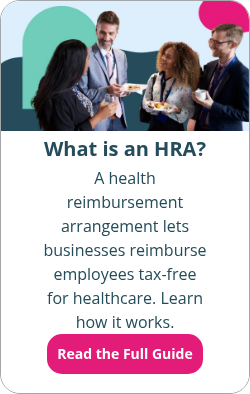How HRAs work for spouses and dependents
By Holly Bengfort on May 9, 2024 at 6:40 AM
Health reimbursement arrangements (HRAs) are a great health benefit that allow you to get tax-free reimbursements on individual health insurance premiums and qualifying medical expenses.
The best part is that you’re not the only one who can benefit from your HRA funds—many of your family members can, too. Though family members don’t receive their own monthly allowance, you can submit their personal expenses for reimbursement from your allowance.
In this article, we’ll go over how your spouse, children, and other tax dependents can also get tax-free reimbursements through your HRA.
Takeaways from this blog post:
- Employers use HRAs to reimburse employees for health insurance premiums and other out-of-pocket medical expenses.
- These medical reimbursement plans can cover qualified expenses for employee spouses if they're legally married.
- Employees can request reimbursement for expenses incurred by their children so long as they legally claim them as dependents.
What is an HRA?
HRAs are an alternative to traditional group health insurance coverage. An HRA is a type of employer-funded health benefit plan that reimburses you for either your health insurance premium, out-of-pocket costs related to your healthcare needs, or both.
The employer funds the HRA and sets the amount available to each employee. You can use your allowance for medical care expenses such as copays, deductibles, prescription drugs, and other healthcare costs.
HRAs are a tax-advantaged benefit for both you and your employer. They provide a way to offer a health benefit without either of you having to pay taxes on the funds used for your insurance policy or out-of-pocket medical costs.
Some HRA types include:
- The qualified small employer HRA (QSEHRA): The QSHERA is made for employers with fewer than 50 full-time equivalent employees (FTEs). Employers must make the benefit available to all their full-time, W-2 employees but can offer varying allowance amounts based on employee family status, such as single or married. Employees can get tax-free reimbursements for insurance premiums and out-of-pocket expenses as long as they have coverage that meets minimum essential coverage (MEC) standards. This includes individual health insurance or group coverage from a spouse or parent.
- The individual coverage HRA (ICHRA): Employees offered an ICHRA must have their own individual health insurance plan to be eligible to participate. Employers can offer different allowance amounts to different employees based on up to 11 employee classes. So, if you're a part-time employee, you may receive less than a full-time employee.
- The group coverage HRA (GCHRA): The GCHRA is only available to employees enrolled in their employer's group health insurance plan. Unlike a QSEHRA or ICHRA, a GCHRA can’t reimburse you for insurance premiums.
- The excepted benefit HRA (EBHRA): If your employer offers you group health plan coverage, you can participate in their EBHRA. Eligible employees don’t need to participate in the group plan.
Plan design, eligibility, and annual contribution limits differ depending on the type of HRA coverage you have.
Can you get reimbursed for your spouse's eligible expenses?
Yes, in most cases, your HRA can reimburse you for your spouse’s medical expenses. If your spouse incurs a qualifying medical expense listed in IRS Publication 502 or the CARES Act, you can submit their expenses for reimbursement just like you would your own eligible expenses. However, for your employer to reimburse you for a spouse's qualified expenses, the IRS must recognize you as being legally married for federal tax purposes.
HRAs are governed by federal regulations s and usually don't cover expenses incurred by partners in domestic partnerships or common law marriages. However, they can cover expenses incurred by spouses in same-sex marriages.
Your spouse will also need to meet the qualifications for the type of HRA you have. If you have a QSEHRA, your spouse only needs MEC coverage to get tax-free reimbursements. This can be from a family plan you purchase on the individual market or through a group plan from their employer.
If you have an ICHRA, your spouse must have a qualifying individual health insurance policy. This can be a family plan you purchase on the marketplace that includes them or their own policy.
If you have a GCHRA, your spouse will need to be on your group health insurance policy.
Premium reimbursement with a QSEHRA
With a QSEHRA, employers can choose to enable employer-sponsored premium reimbursement (ESPR) that allows for reimbursement of a spouse's group health plan coverage.
If ESPR is enabled, you can be reimbursed for premiums paid for your spouse's employer-provided health plan with a QSEHRA. Suppose your spouse paid the premium with pre-tax contributions. In that case, the IRS requires1 the QSEHRA reimbursement to count as taxable income. This is because your spouse is already making a payroll deduction pre-tax.
However, if your spouse didn’t pay the premiums pre-tax, they may be eligible for tax-free reimbursement. IRS Notice 2017-67 states, “the reimbursement is taxable to the extent that the spouse’s share of premiums was paid on a pre-tax basis.”
Are there special rules for spouses who each have separate HRA allowances?
Sometimes, an employee and their spouse may both have HRA allowances. This can happen if you’re employed by the same company or have an HRA through different employers. It's important for employee spouses to avoid double reimbursement for the same medical expense. While both spouses can submit reimbursement requests for an eligible medical expense, the total reimbursement shouldn't exceed the original cost.
For example, suppose a married couple—Taylor and Andy—are both eligible for separate HRA allowances. Taylor receives $300 from their employer, and Andy receives $350. They share a family health insurance policy with a monthly premium of $1,000.
In this case, both Taylor and Andy can submit the premium for reimbursement because their combined reimbursement would be $650 (less than the total cost of $1,000). If they switched to a policy costing $600, they would need to coordinate their reimbursement requests so they only receive $600 every month.
Otherwise, it would lead to improper reimbursement. As such, it's very important that married couples communicate with each other on how they'll handle HRA reimbursement requests.
Can you get reimbursed for your children's eligible expenses?
Spouses aren't the only family members who can get tax-free reimbursements from an employee's HRA funds. Employees can also submit reimbursement requests for eligible expenses incurred by their children, so long as they legally claim them as dependents.
For the medical expense deduction, the IRS typically considers a person your eligible dependent if these certain conditions are met:
- They're your son, daughter, stepchild, adopted child, foster child, brother, sister, stepbrother, stepsister, half-brother, half-sister, or a descendant of any of them (such as your grandchild, niece, or nephew).
AND also meet one of the following:
- They were younger than 19 at the end of the previous year and younger than you (or your spouse if filing jointly).
- They were younger than 24 at the end of the previous year, a full-time student, and younger than you (or your spouse if filing jointly).
- Any age and permanently and totally disabled.
- They live with you for more than half of the year.
- They don't provide more than half of their own support for the year.
- They don't file a joint return other than to claim a refund.
For purposes of medical and dental expenses deduction, a child of divorced or separated parents can be a dependent of both parents. Each parent can include the medical expenses they pay for the child, even if the other parent claims the child's dependency exemption, unless the child is in the custody of one or both parents for more than half the year.
If your child is 18 or older, they must not meet either of the following criteria:
- They received a gross income of $4,200 or more in the previous year.
- They filed a joint return in the previous year.
Can you get reimbursed for other tax dependents' eligible expenses?
You may have someone in your household who isn’t your child but is a dependent that you wish to get expenses reimbursed for.
This person can’t be a qualifying child or dependent of any other taxpayer that year and you must provide more than half of this dependent's support.
If these two conditions are met, the dependent(s) can be one of the following:
- Brother, sister, half-brother, half-sister, or a son or daughter of any of them.
- Father, mother, or an ancestor or sibling of either of them (for example, your grandmother, grandfather, aunt, or uncle).
- Stepbrother, stepsister, stepfather, stepmother, son-in-law, daughter-in-law, father-in-law, mother-in-law, brother-in-law, or sister-in-law.
- Any other person (other than your spouse) who lived with you all year as a member of your household if your relationship didn't violate local law.
Where can you purchase a qualified health plan?
If your employer offers you a stand-alone HRA like a QSEHRA or ICHRA, you qualify for a special enrollment period to enroll in a health policy within 60 days. This allows you to purchase a plan outside of the regular open enrollment period. If you need to purchase coverage for yourself or your family, you can buy it directly from an insurance carrier, an insurance broker, or the individual market.
If your employer offers an HRA through PeopleKeep, you can shop for a policy from your online dashboard through one of our partners. This makes it easy for you to find a policy that works for your needs.
Conclusion
With an HRA, your benefit allows you to get reimbursed for expenses that you, your spouse, your children, or any other tax dependent incur throughout the year, making for a unique and flexible benefit that works for a variety of family situations—something a traditional group health insurance plan simply can't offer.
This article was originally published on April 1, 2020. It was last updated on May 9, 2024.
Check out more resources
See these related articles

What is group health insurance?
Curious about group health insurance? This comprehensive guide explains the ins and outs of group coverage and how it works for your organization.

10 health reimbursement arrangement FAQs
Confused about health reimbursement arrangements? Get clarity with these 10 commonly asked questions about HRAs and HRA rules.

What to expect when your employer offers you an ICHRA
Curious about ICHRAs? Discover what to expect when your employer offers you an individual coverage health reimbursement arrangement with this guide.



